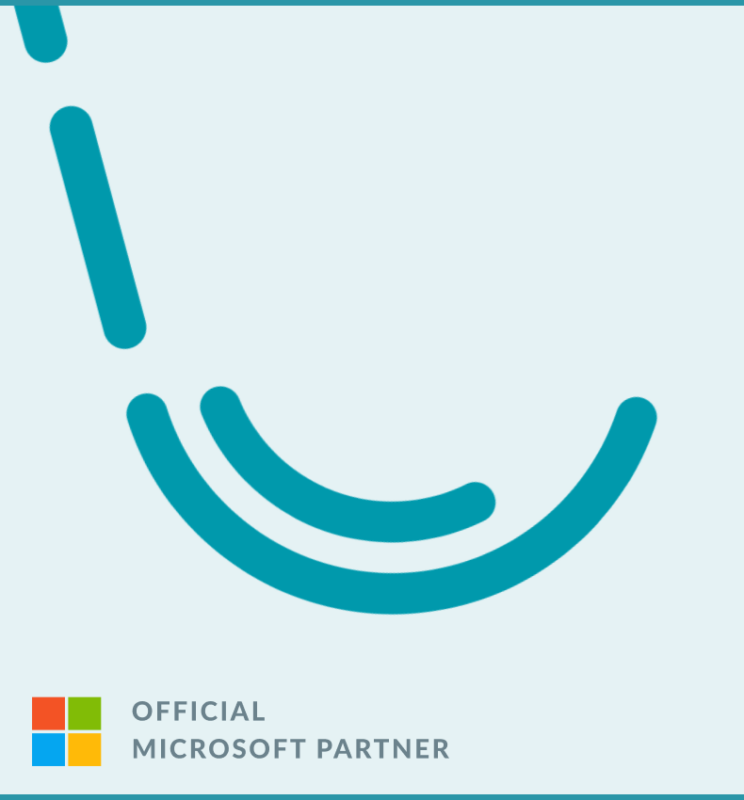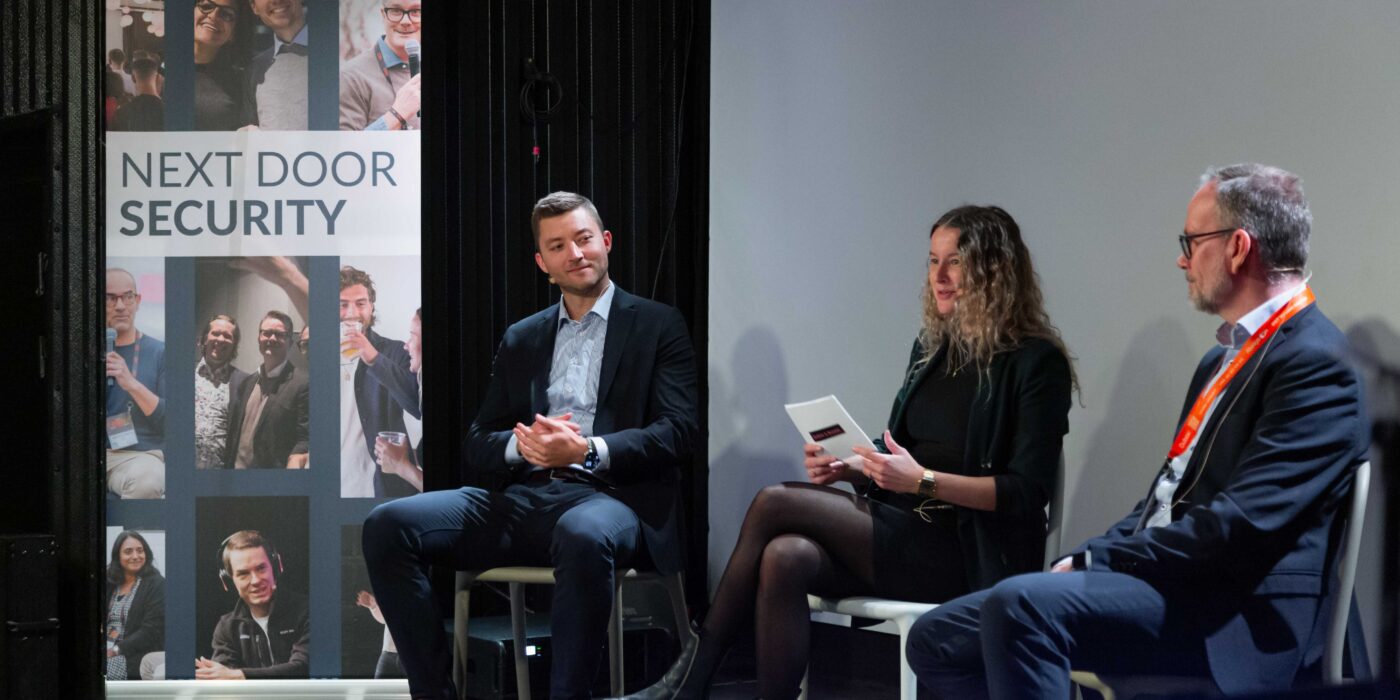Introduction
Cybersecurity is no longer just an IT concern; it has become a fundamental business strategy. Companies that fail to prioritize security risk not only financial losses but also reputational damage and regulatory penalties.
In a panel discussion at Next Door Security Aarhus hosted by Stine Kjærsgaard, cybersecurity experts Peer Kristensen, CEO of Security Tech Space, and Michael Venø Bækgaard, Group CISO at Salling Group, shared their insights. They explored how cybersecurity impacts businesses, the challenges of implementation, and the future of cyber resilience.
Here’s a deep dive into the key takeaways from their discussion.
Key Takeaways

Cybersecurity is a competitive advantage
Companies integrating cybersecurity into their business model gain trust and regulatory approval.

Regulations are important, not a dealbreaker
Enterprises doesn’t necessarily require start-ups to be fully compliant, but expects them to take cybersecurity seriously and explain their approach.

Winning over peers is the key
Startups should not target CISOs directly. If the IT or security team loves a solution, the CISO is far more likely to approve it.

Integration & scalability matter
Large enterprises prioritize security solutions that integrate seamlessly into their existing infrastructure.

SMEs lag behind in cybersecurity
A significant number of businesses in Denmark have yet to implement basic cybersecurity measures.

Talent shortage is a critical issue
The industry needs more skilled professionals, with an estimated 22.000 cybersecurity jobs required by 2030.
Cybersecurity as a Business Imperative
Cybersecurity is no longer an optional investment; it’s a business necessity. According to Michael Venø Bækgaard, some companies see security as a competitive edge, ensuring compliance and trust, while others still view it as an expense.
Currently, around 116.000 Danish businesses have yet to incorporate cybersecurity into their operations. This gap presents an opportunity for security firms to offer innovative, scalable solutions that align with business needs.
The Competitive Edge of Cybersecurity
Businesses that embed security into their core operations enjoy several advantages:
- Stronger partnerships: Many enterprises, including Salling Group, require their vendors to have robust cybersecurity frameworks.
- Regulatory compliance: Adhering to standards like NIS2 makes companies more attractive to investors and customers.
- Enhanced reputation: A security-first approach builds customer confidence and brand loyalty.
Michael Venø Bækgaard emphasized that while compliance is important, it’s not a dealbreaker when working with start-ups:
I don’t require start-ups to be fully compliant with major regulations, but they do need to be doing something about cybersecurity. More importantly, they must be able to argue for what they are doing.
This means that companies don’t necessarily need to have every certification in place—but they do need a well-thought-out cybersecurity strategy.

Barriers to Cybersecurity Implementation
Despite the clear benefits, many companies struggle with cybersecurity adoption. Peer Kristensen highlighted several common barriers:
- Cost: SMEs often perceive security as a financial burden rather than an investment.
- Lack of awareness: Many business leaders do not fully understand the risks of cyber threats.
- Shortage of skilled professionals: Companies find it challenging to hire cybersecurity experts.
To overcome these barriers, businesses must adopt a proactive approach, leveraging partnerships and automation to optimize their security measures.
Talent Shortage and Workforce Challenges
One of the most pressing issues in the cybersecurity industry is the lack of qualified professionals. By 2030, Denmark will need an additional 22.000 cybersecurity specialists.
As Peer comments:
One of the biggest challenges in cybersecurity today isn’t just technology—it’s people. We need more skilled professionals, and if we don’t address the talent shortage, companies will struggle to implement even the most basic security measures.
Bridging the Talent Gap
Companies like Salling Group address this challenge by:
- Upskilling existing employees: Training staff internally to develop security expertise.
- Graduate and internship programs: Bringing in young talent early and fostering a security-conscious culture.
- Decentralizing security responsibilities: Embedding security roles within different teams to reduce dependency on a central IT department.

The Role of Regulation in Cybersecurity
Regulations like the EU’s NIS2 directive are pushing companies to prioritize cybersecurity. While compliance can be burdensome, it also elevates industry standards.
Michael Venø Bækgaard emphasized that regulatory frameworks drive adoption, ensuring businesses take security seriously. However, he acknowledged that regulation alone is not the solution:
I don’t believe in just following a checklist of 120 security questions. What really matters is whether a company has integrated cybersecurity into its mindset and operations.
This underscores the importance of practical security implementation rather than just ticking compliance boxes.
Building a Cyber-First Business Strategy
For startups and growing businesses, cybersecurity should be integrated from day one. Large enterprises, like Salling Group, prefer working with vendors that prioritize security.
Key Considerations for Cybersecurity Startups
- Develop security-first products: Ensure security is built into the core of your solutions.
- Focus on integration: Large companies look for seamless integration with existing systems.
- Demonstrate compliance: Following recognized cybersecurity standards builds trust.
- Collaborate with industry players: Partnerships can open doors to new opportunities.
However, Michael Venø Bækgaard offered a crucial piece of advice for startups:
If you want to sell to me, don’t target me. Target my technical peers. If they love your solution, I will love it too.
This highlights the power of internal buy-in—a security solution is far more likely to be adopted if IT teams are excited about it.
Conclusion
Cybersecurity is no longer a niche concern – it’s a business necessity. Companies that integrate security into their operations gain a competitive edge, comply with regulations, and protect their assets from cyber threats.
For businesses looking to strengthen their security posture, the key is to adopt a proactive approach: invest in cybersecurity talent, embrace regulatory frameworks, and prioritize security from the ground up. Whether you’re a startup or an established enterprise, cybersecurity should be a cornerstone of your business strategy.
Our speakers: Cybersecurity in Business

Group CISO, Salling Group
Michael Venø Bækgaard is the Group Chief Information Security Officer (CISO) at Salling Group, Denmark’s largest FMCG retailer. With extensive experience in cybersecurity, IT governance, and risk management, he plays a crucial role in shaping Salling Group’s security strategy. Michael is also responsible for vetting IT purchases and ensuring that cybersecurity is embedded into the company’s core operations.

CEO, Security Tech Space
Peer Kristensen is the CEO of Security Tech Space, a leading Danish cybersecurity hub dedicated to fostering innovation, collaboration, and talent development within the cybersecurity industry. With a strong background in business development and security strategy, Peer is a key advocate for bridging the talent gap in the sector. His work focuses on helping startups and enterprises navigate cybersecurity challenges, emphasizing the importance of integrating security as a business enabler rather than a cost burden.

Moderator, Co-Founder of Bobbie & Beastie
Stine Kjærsgaard is the co-founder of Bobbie & Beastie, a Copenhagen-based consultancy that helps growth-stage companies build effective marketing strategies. With a passion for cybersecurity, she moderates industry panels and discussions, bringing together business leaders, security experts, and investors to explore the evolving landscape of cyber threats and solutions.
FAQs

What are the biggest cybersecurity challenges for businesses today?
The biggest challenges include the cost of implementation, lack of awareness, shortage of skilled professionals, and compliance with evolving regulations.

How does cybersecurity impact business growth?
A strong cybersecurity framework enhances customer trust, ensures regulatory compliance, and opens doors to new business opportunities. Companies with robust security measures are more attractive to investors and partners.

Why is there a cybersecurity talent shortage?
Cybersecurity is a highly specialized field, and demand for professionals has outpaced supply. Companies are addressing this by upskilling employees and developing talent pipelines.

How can startups make their cybersecurity solutions appealing to large enterprises?
Startups should prioritize integration, compliance, and scalability. Solutions that fit seamlessly into existing enterprise systems and meet regulatory standards are more attractive to large companies.







